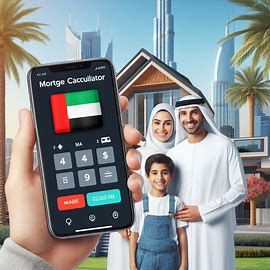A mortgage calculator UAE is a tool designed to help individuals estimate their monthly mortgage payments based on certain variables, such as the loan amount, interest rate, and loan term. This tool is invaluable for anyone looking to purchase property in the UAE, as mortgage calculator UAE offers insights into the financial commitment they are about to take on. By inputting the relevant details, potential buyers can get a clear picture of what their payments might be, helping them make informed decisions when it comes to their property investment in the UAE.
Why Should You Use a Mortgage Calculator in the UAE?
1. Helps You Plan Your Budget
By inputting various loan details into a mortgage calculator, you can get a clear picture of how much you need to pay monthly. This makes it easier to create a budget, ensuring you’re not overextending yourself financially.
2. Understand Your Affordability
Knowing how much you can afford to borrow is crucial. A mortgage calculator helps you determine this by factoring in your income, current financial obligations, and the type of property you want to buy.
3. Compare Different Loan Options
One of the best features of mortgage calculators is the ability to compare different loan scenarios. You can play around with different interest rates, loan amounts, and repayment terms to see how they affect your monthly payments.
4. Helps You Plan for the Future
By forecasting your mortgage payments, you’ll have a clearer idea of how your financial situation will evolve over time, allowing you to plan for future expenses, investments, or savings goals.
How Does a Mortgage Calculator Work in the UAE?
A typical mortgage calculator in the UAE works by asking for the following information:
- Loan Amount: This is the amount you intend to borrow from the bank or lender.
- Interest Rate: The rate of interest charged on the mortgage loan, which is usually annual.
- Loan Term: The duration of the mortgage, which can range from 5 to 30 years, depending on the lender and the buyer's preferences.
- Down Payment: The initial amount you plan to pay upfront. In the UAE, this is typically around 20% for residents and 25% for non-residents.
- Property Value: The total value of the property you're purchasing, which helps determine your loan-to-value ratio (LTV).
Once these factors are entered, the calculator will generate an estimate of your monthly mortgage payments.

Key Factors That Affect Your Mortgage in the UAE
1. Loan-to-Value Ratio (LTV)
The LTV ratio is the proportion of the loan compared to the value of the property. For example, if you are buying a property worth AED 1 million and are borrowing AED 800,000, your LTV is 80%. A lower LTV can result in a lower interest rate and better loan terms.
2. Interest Rates
The UAE's mortgage rates vary between lenders, so it’s important to shop around to find the best deal. Fixed-rate mortgages lock in an interest rate for a set period, while variable rates can fluctuate. The mortgage calculator helps you assess how these rates will impact your monthly payments.
3. Loan Term
The length of your loan term affects the size of your monthly payments. A longer loan term will result in smaller monthly payments, but you’ll pay more in interest over the life of the loan. A shorter term means higher monthly payments but less total interest paid.
4. Down Payment
In the UAE, you’ll typically need a down payment of 20% to 25%. The more you can put down initially, the less you’ll need to borrow, which could lead to lower monthly payments and potentially better loan terms.
Benefits of Using a Mortgage Calculator in the UAE
1. Time-Saving
Rather than manually calculating different scenarios or visiting lenders to get quotes, a mortgage calculator instantly provides you with estimates, helping you make decisions more efficiently.
2. Accurate Results
Mortgage calculators offer an accurate breakdown of monthly payments, which can include principal and interest, taxes, and insurance. This gives you a holistic view of your financial commitment.
3. Easy to Use
Most online mortgage calculators are simple to use. All you need is access to a computer or smartphone and the relevant loan information. It’s as simple as inputting your figures and receiving the results.
Common Mistakes to Avoid When Using a Mortgage Calculator
1. Not Accounting for Additional Costs
When using a mortgage calculator, ensure you account for additional costs like property maintenance, insurance, and service charges. These can significantly add to your monthly expenses.
2. Overestimating Your Affordability
While it’s tempting to borrow as much as possible, it’s important to be realistic about your income and expenses. Use the calculator to evaluate how much you can comfortably afford to pay each month.
3. Ignoring the Impact of Interest Rates
Interest rates can have a major impact on your mortgage payments. Always try different rates in the calculator to see how they affect the overall cost of your mortgage.
Finding the Different Types of Mortgages Available in the UAE
When considering a mortgage in the UAE, it’s important to understand the different types of mortgages available. Each type offers unique benefits depending on your financial situation and long-term goals. Below are the most common mortgage types offered by lenders in the UAE:
1. Fixed-Rate Mortgages
With a fixed-rate mortgage, the interest rate remains the same for a set period—typically 1, 3, or 5 years. This ensures that your monthly payments will not change during the agreed period, providing stability and predictability in your budget. Fixed-rate mortgages are ideal for buyers who want to lock in a rate during a time of low-interest rates or those who prefer consistency in their payments.
2. Variable-Rate Mortgages
A variable-rate mortgage, or adjustable-rate mortgage, has an interest rate that changes over time. The rate is typically tied to a benchmark rate (such as the EIBOR—Emirates Interbank Offered Rate), and it can fluctuate based on market conditions. While your monthly payments might be lower initially, they can rise if interest rates increase, which could impact your long-term budget.
3. Hybrid Mortgages
Hybrid mortgages combine elements of both fixed and variable rates. For the first few years, you may have a fixed rate, after which the rate switches to a variable rate. This offers some initial stability, with the possibility of benefiting from lower rates later on.
4. Islamic Mortgages (Home Ijarah and Murabaha)
For those who follow Islamic finance principles, Islamic mortgages are a suitable option. These mortgages are based on profit-sharing agreements rather than charging interest. The two most common Islamic mortgage products in the UAE are Home Ijarah (leasing) and Murabaha (cost-plus financing), which ensure that the transaction adheres to Sharia law. These options are popular among Muslim residents and investors.
5. Home Equity Loans
For those who already own a property and have built up equity, a home equity loan can be a viable option. This allows homeowners to borrow against the value of their property for purposes such as home improvements, debt consolidation, or funding a business. The loan amount is usually determined by the equity you have in the property.
Key Benefits of Mortgage Refinancing in the UAE
Mortgage refinancing is an option for homeowners in the UAE looking to adjust the terms of their current mortgage or obtain a lower interest rate. Refinancing can help reduce your monthly payments, shorten your loan term, or even access extra funds. Here’s why refinancing might be the right choice for you:
1. Lower Interest Rates
If interest rates have decreased since you took out your original mortgage, refinancing can allow you to secure a better rate, which could significantly reduce your monthly payments over time.
2. Access to Home Equity
If your property has increased in value, you may be able to refinance and borrow additional funds based on your home's equity. This can be useful for home improvements or other financial needs.
3. Changing Loan Terms
Refinancing can help you adjust your loan term. If you want to pay off your mortgage faster, you can opt for a shorter loan term, which will likely come with higher monthly payments but lower overall interest. Alternatively, you may extend your term to lower your payments, though this could result in higher interest payments in the long run.
4. Switching Mortgage Providers
Some homeowners in the UAE refinance to switch to a different bank that offers better rates or more favorable terms. It’s an excellent way to explore other mortgage products and find the best deal for your financial situation.
Understanding the Legal Aspects of Mortgages in the UAE
Before securing a mortgage in the UAE, it’s crucial to understand the legal framework surrounding property purchases and mortgages in the country. There are certain legal requirements and protections that both buyers and lenders must follow.
1. Eligibility for Mortgages
In the UAE, both residents and non-residents can apply for a mortgage. However, the eligibility criteria vary for each group. Residents typically have more flexible terms, such as a lower down payment requirement. Non-residents may face higher down payment requirements, often around 25%, as well as stricter lending criteria. Lenders will also assess your income, credit history, and debt-to-income ratio before approval.
2. Property Ownership Regulations for Non-Residents
Non-residents are allowed to purchase property in specific areas known as "freehold zones." These zones include areas such as Dubai Marina, Palm Jumeirah, and Downtown Dubai. In these areas, foreign buyers can purchase property with full ownership rights. Outside of these designated areas, non-residents are typically restricted to leasehold properties.
3. The Mortgage Agreement
Once you have chosen your lender and mortgage, the mortgage agreement will outline the terms, including the loan amount, interest rate, repayment schedule, and any additional fees. It’s important to carefully review the agreement and seek legal advice if needed, to ensure that all terms are favorable.
4. Notary and Registration
In the UAE, once a property sale is agreed upon, the contract must be notarized and registered with the relevant land department to ensure legal ownership. This step is important for securing the property and is part of the mortgage process for property buyers.

The Impact of Credit Scores on Mortgages in the UAE
Your credit score plays a significant role in determining the terms of your mortgage in the UAE. Lenders rely on your credit score to assess the risk of lending you money. A higher credit score generally indicates to lenders that you are a reliable borrower, which could result in more favorable loan terms, such as a lower interest rate.
1. What is a Credit Score?
A credit score is a numerical representation of your creditworthiness based on your credit history, including factors like your repayment history, outstanding debts, and the number of credit inquiries made. In the UAE, the Al Etihad Credit Bureau (AECB) provides credit scores for individuals.
2. How Credit Scores Affect Mortgage Applications
Lenders in the UAE use your credit score to determine the likelihood of timely repayment. A score above 650 is generally considered good, and those with higher scores may be eligible for better mortgage rates. On the other hand, a low score may result in higher interest rates or a denied application.
3. Improving Your Credit Score
To improve your credit score before applying for a mortgage, focus on paying off outstanding debts, avoiding late payments, and reducing your overall credit utilization ratio. A higher score can lead to more competitive mortgage terms.
Tips for First-Time Homebuyers Using Mortgage Calculators
If you’re a first-time homebuyer in the UAE, using a mortgage calculator effectively can help you navigate the complexities of property financing. Here are some tips to make the most out of your mortgage calculator experience:
1. Know Your Budget
Before using the mortgage calculator, set a clear budget. Consider all of your monthly expenses, not just your mortgage, to ensure you’re not overextending yourself financially. The calculator will help you adjust the loan amount and terms to match your budget.
2. Factor in Additional Costs
Beyond the principal and interest, remember to include other costs such as insurance, property taxes, and maintenance fees. These can add up and affect your overall affordability.
3. Try Different Scenarios
Don’t settle for the first result you get. Play around with different loan amounts, interest rates, and terms to find a payment structure that works best for your financial goals.
4. Consult with Professionals
Even after using a mortgage calculator, it’s essential to speak with a mortgage advisor or real estate agent to ensure that you're making informed decisions. They can provide insights into the best mortgage options available to you.
Conclusion
Navigating the mortgage landscape in the UAE can seem complex, but with the right tools and information, it becomes much more manageable. Whether you're a first-time homebuyer, a non-resident looking to invest, or a homeowner considering refinancing, understanding the various mortgage types and the factors that affect your mortgage application is crucial. Using tools like mortgage calculators, understanding your credit score, and exploring the best mortgage products for your needs will help you make informed decisions.




